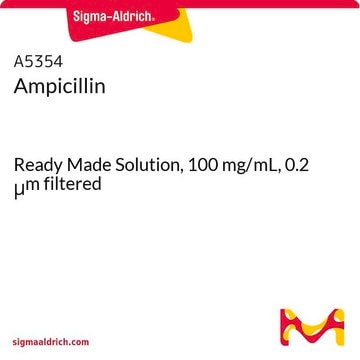K1876
Kanamycin disulfate salt from Streptomyces kanamyceticus
aminoglycoside antibiotic
동의어(들):
Kanamycin Disulfate Salt, Kanamycin disulfate, O-3-amino-3-deoxy-alpha-D-glucopyranosyl-(1->6)-O-(6-amino-6-deoxy-alpha-D-glucopyranosyl-(1->4))-2-deoxy-D-Streptamine sulfate (1:2) (salt), Kanamycin A, Kanamycin acid sulfate
About This Item
추천 제품
생물학적 소스
Streptomyces kanamyceticus
Quality Level
형태
powder
효능
~650 μg per mg
불순물
≤4% Kanamycin B
색상
white to off-white
solubility
H2O: 10 mg/mL
항생제 활성 스펙트럼
Gram-negative bacteria
Gram-positive bacteria
mycobacteria
mycoplasma
동작 모드
protein synthesis | interferes
SMILES string
OS(O)(=O)=O.OS(O)(=O)=O.NC[C@H]1O[C@H](O[C@@H]2[C@@H](N)C[C@@H](N)[C@H](O[C@H]3O[C@H](CO)[C@@H](O)[C@H](N)[C@H]3O)[C@H]2O)[C@H](O)[C@@H](O)[C@@H]1O
InChI
1S/C18H36N4O11.2H2O4S/c19-2-6-10(25)12(27)13(28)18(30-6)33-16-5(21)1-4(20)15(14(16)29)32-17-11(26)8(22)9(24)7(3-23)31-17;2*1-5(2,3)4/h4-18,23-29H,1-3,19-22H2;2*(H2,1,2,3,4)/t4-,5+,6-,7-,8+,9-,10-,11-,12+,13-,14-,15+,16-,17-,18-;;/m1../s1
InChI key
OGTKIXVMLDAMNU-KNQICTBBSA-N
일반 설명
애플리케이션
생화학적/생리학적 작용
Mode of Resistance: Aminoglycoside-modifying enzymes (including acetyltransferase, phosphotransferase, nucleotidyltransferase) can alter this antibiotic, preventing its interaction with ribosomes.
Antimicrobial Spectrum: Kanamycin sulfate is effective against gram-negative and gram-postiive bacteria, and mycoplasma.
주의사항
제조 메모
신호어
Danger
유해 및 위험 성명서
Hazard Classifications
Repr. 1B
Storage Class Code
6.1C - Combustible acute toxic Cat.3 / toxic compounds or compounds which causing chronic effects
WGK
WGK 3
Flash Point (°F)
Not applicable
Flash Point (°C)
Not applicable
개인 보호 장비
Eyeshields, Gloves, type P3 (EN 143) respirator cartridges
시험 성적서(COA)
제품의 로트/배치 번호를 입력하여 시험 성적서(COA)을 검색하십시오. 로트 및 배치 번호는 제품 라벨에 있는 ‘로트’ 또는 ‘배치’라는 용어 뒤에서 찾을 수 있습니다.
이미 열람한 고객
문서
Antibiotics targeting bacterial ribosomes disrupt protein synthesis, a key process in bacterial growth inhibition.
자사의 과학자팀은 생명 과학, 재료 과학, 화학 합성, 크로마토그래피, 분석 및 기타 많은 영역을 포함한 모든 과학 분야에 경험이 있습니다..
고객지원팀으로 연락바랍니다.








